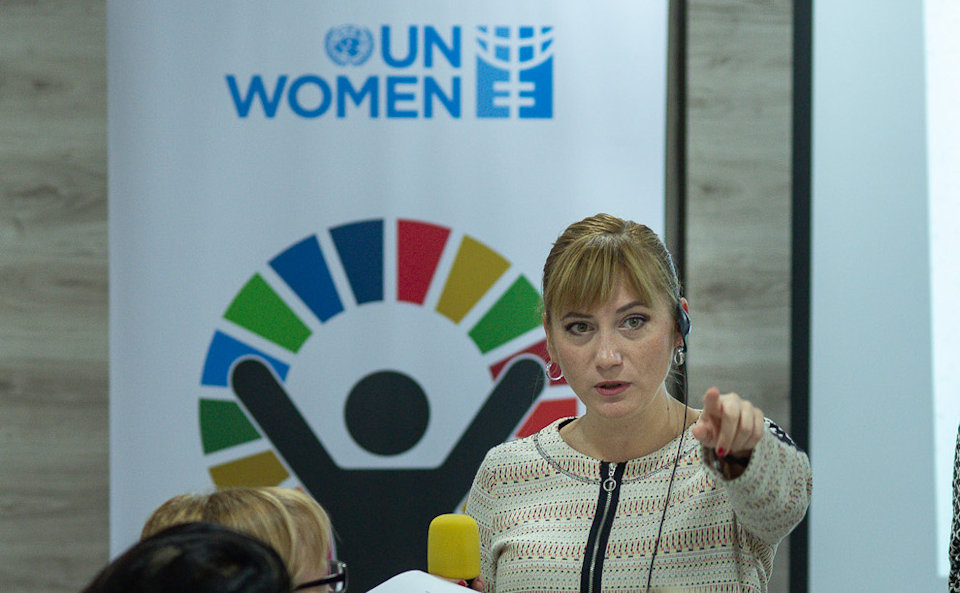In the words of Marija Risteska: “The recognition of civil society as government’s partner in the process of aligning national laws with the Istanbul Convention is our biggest achievement”
Date:
Marija Risteska is the Executive Director of Centre for Research and Policy Making, a civil society organization from North Macedonia, partner of the UN Women regional programme on ending violence against women “Implementing Norms, Changing Minds,” funded by the European Union. Risteska spoke to UN Women about the changes brought by the new law on ending violence against women, adopted in January, and the new amendments to the Criminal Code, yet to be adopted. She also shares her insights on how civil society organizations must sit at the same table with government counterparts in order to ensure the advancement of women’s rights and gender equality in North Macedonia.

In a divided and polarized political scene, we can say proudly that the new law on ending violence against women finally received support from all political parties and was one of the rare legal documents adopted with consensus at the beginning of this year. The adoption of this law will improve the system of support and protection for survivors of violence. It defines all forms of violence against women, incorporates the principle of due diligence (the responsibility of the state to act to prevent, investigate, and punish acts of violence), and makes a distinction between general services available to all women survivors of violence - health and social services - and specialized services, defined as those that respond to the specific needs of women who experience different types of violence, such as SOS helpline, psycho-social counselling, free legal aid, temporary shelters for different types of violence, special protection, support and long-term treatment for women who suffered from sexual violence and rape. Another novelty in the law is the regulation of socio-economic integration of women survivors by developing programmes and measures for assistance and support tailored to each woman’s needs, including temporary housing, psychotherapy and mentorship, financial aid, education and training in different areas and measures for employment.
The process of drafting the legislation was so wide, consultative, participatory and, above all, democratic, that it ensured respect and recognition from government counterparts. The recognition of civil society as a partner of government in the process of policy alignment with the Istanbul Convention, sitting at the same table and ensuring consensus beyond party lines, is our biggest achievement so far within our project.
We will continue to monitor the government’s establishment of the National Coordination Body for Violence against Women and Domestic Violence, which will work on preparing and adopting the new national strategy for violence against women and domestic violence. Furthermore, we are advocating for the adoption of the reintegration programme for women survivors of violence by the Ministry of Labour and Social Policy, with clearly marked responsibilities and financial allocations from all relevant institutions and the establishment of a state fund to financially support women victims of violence who have left violent situations and are at social risk.
Also, after analyzing the gap between the Criminal Code and the Istanbul Convention, we have drafted amendments to the Code and have actively participated in the working group for revising the Criminal Code. We have included new definitions of family violence, gender-based violence, and women as victims of violence. The proposed amendments also criminalize female genital mutilation, sexual assault without consent, sexual harassment and stalking, and update the definitions of domestic violence and rape. The proposal is now waiting to be published for online legislative consultation, after which the government will adopt the draft proposal for changing the Criminal Code and send it to Parliament for debate and adoption. We will continue working on building consensus among all parties to garner support for the changes of the Criminal Code, which will fully align Macedonian legislation with the Istanbul Convention.
Our lessons learned while taking part in the development of the new law on ending violence against women is that persistence and readiness to speak with everyone on every issue relevant to the policy change is key. “Do not give up; visualize and personalize your advocacy efforts, as every victim, service provider, prosecutor, judge, or policy maker –has a face and a name and can become personally invested in the changes you are advocating for.”